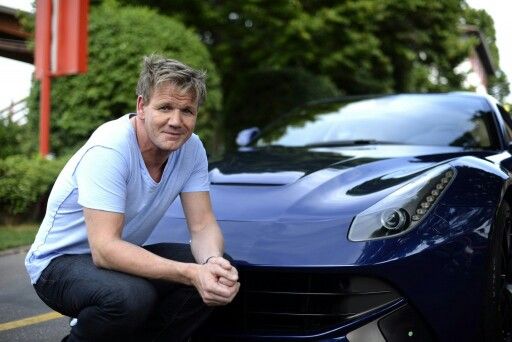
Today, Gordon Ramsay is known across the globe — a Michelin-starred chef, a TV titan, a business mogul with restaurants from London to Las Vegas. His name is synonymous with culinary excellence and fiery passion. But before the fame, the cameras, and the empire, there was a teenage boy with a broken home, a shattered dream, and no idea where his next meal would come from. This is not just a story about food. It’s about survival. It’s about failure. And ultimately, it’s about one man’s relentless determination to rise. Gordon James Ramsay was born on November 8, 1966, in Renfrewshire, Scotland, but raised in Stratford-upon-Avon, England. His childhood was marked by instability and hardship. His father, Gordon Sr., struggled with alcoholism and was frequently abusive — emotionally and physically. The family moved often, sometimes with barely enough money for rent or food.
Gordon has spoken candidly in interviews about those early years. “There were times we had nothing,” he recalled. “No heating. No fridge. My father would vanish for days. My mother worked three jobs. And I’d lie awake at night listening to them fight.” It was sport — not cooking — that first offered him a way out. A gifted footballer, Ramsay was recruited to play for the Glasgow Rangers as a teenager. His dream was to go pro. For a time, it looked like he might. But fate had other plans. At age 18, a devastating knee injury ended his football career before it had truly begun.
The loss was crushing. Ramsay spiraled, unsure of what to do next. He worked a series of odd jobs, sometimes sleeping on couches or even in the streets after arguments at home. “I felt completely lost,” he admitted. “That was my lowest point. Football was everything.” But in the chaos, something unexpected happened: he found himself in a kitchen. At first, it was just a job — a way to pay bills. He started washing dishes, then prepping vegetables, then learning basic sauces. But soon, Ramsay became obsessed with the precision, the discipline, the fire of the kitchen. He devoured cookbooks. He stayed late to practice. He watched, listened, and absorbed everything.

His raw talent and unstoppable work ethic quickly caught the attention of big names. Ramsay earned a spot under the legendary Marco Pierre White in London, one of the most volatile and respected chefs of the era. The environment was brutal — but Ramsay thrived. “Marco taught me how to survive in the kitchen,” he said. “He was a madman, but a genius.” From there, Ramsay continued to climb. He worked in France under culinary titans like Guy Savoy and Joël Robuchon, mastering classical French technique. He returned to London with a new confidence and a clear mission: to become one of the best chefs in the world.
In 1998, at the age of 31, Ramsay opened his first restaurant: Restaurant Gordon Ramsay in Chelsea. Within three years, it earned three Michelin stars — the highest honor in the culinary world. He was one of the youngest chefs in history to receive such recognition. The homeless teen had become a king of cuisine. But Gordon Ramsay wasn’t done. He didn’t want to be just a chef. He wanted to build a legacy. Over the next two decades, he expanded into television, launching shows like Hell’s Kitchen, Kitchen Nightmares, MasterChef, and Next Level Chef. Unlike other celebrity chefs, Ramsay didn’t soften his persona for the screen. He was blunt, often furious, and rarely filtered — but behind every outburst was a deep respect for excellence.
His television persona made him a household name, but it also came with criticism. Some accused him of bullying or being overly dramatic. Ramsay’s response? “I’m tough on the outside because I expect greatness. Mediocrity has no place in my kitchen. I’ve been through hell. I know what it takes.” Today, Gordon Ramsay’s empire includes over 50 restaurants worldwide, a production company, bestselling cookbooks, and a net worth exceeding $220 million. But money was never the goal. For Ramsay, success is about legacy — and proving that where you start does not define where you end up.
He often returns to his roots, working with underprivileged youth and supporting anti-homelessness charities. “I know what it’s like to have nothing,” he says. “And I’ll never forget that.” Ramsay’s story is not just inspirational — it’s essential reading for anyone who has ever felt like giving up. He wasn’t born into privilege. He didn’t have connections. What he had was pain, hunger, and grit — and he turned them into fuel.
